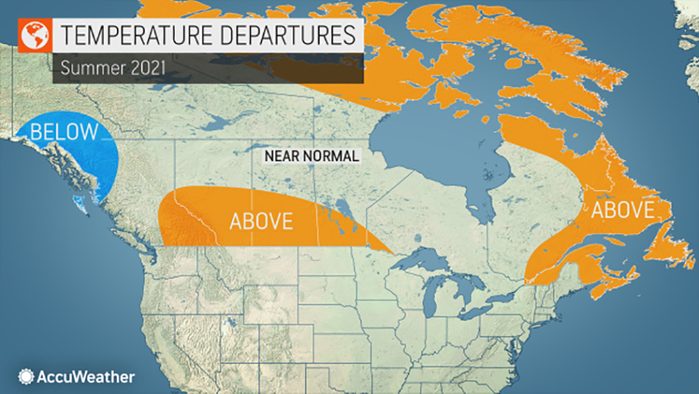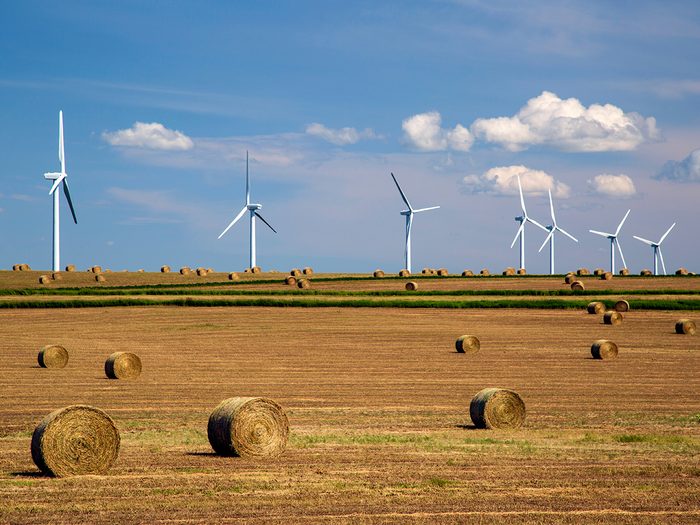
A sneak peek at Canada’s 2021 summer forecast
Sunday, June 20, marks the official beginning of summer, but Canadians are already dreaming of backyard BBQs and sun-soaked outdoor adventures after another long spring spent sheltering in place.
While it’s always important to check daily local weather conditions before making firm plans, the meteorologists at AccuWeather have just released a long-range forecast to provide a glimpse at the broader weather trends expected over the next several months.
Check out the seasonal weather forecast for summer 2021 across Canada.

Summer forecast for British Columbia: A very “Vancouver” kind of summer
According to AccuWeather, a storm track from the Gulf of Alaska could mean a cooler-than-normal—and significantly wetter—summer for those living in northwestern B.C. “Most of the Pacific moisture, at least for the first half of the summer, will likely be directed into northwestern British Columbia,” says Brett Anderson, AccuWeather’s senior meteorologist. As a result of this, Anderson says the region will likely experience “cloudier and cooler days compared to normal.”
Those in the Vancouver area, however, are expected to be spared that somewhat miserable summer forecast. The cooler-than-normal waters of the Pacific will have a moderating effect, keeping conditions very near seasonal, with average highs ranging from 18-22° C from June through August.
Read up on the fascinating science behind weather prediction.

Summer forecast for the Prairies: “A tale of two summers”
The 2021 summer forecast from the Rockies eastward through Manitoba varies wildly by latitude, with AccuWeather dubbing it, “A tale of two summers.”
Those living in southern parts of Alberta, Saskatchewan and Manitoba are in for above-normal temperatures as dry conditions from the American Plains extend north. Although this means that thunderstorm activity is expected to be minimal, it could bring with it severe—and potentially disastrous—drought conditions, as well as low river and stream levels. These warmer- and drier-than-normal conditions also set the stage for a particularly bad wildfire season. According to Anderson, water-use restrictions will likely be issued through much of the summer. (Find out what it was like on the hottest day in Canadian history.)
Meanwhile, the northern parts of the prairies will likely benefit from those cool and wet conditions extending from northern British Columbia. These storms from the west coast should bring some much-needed precipitation to the region, but also the potential for lightning strikes, which in turn could spark wildfires.

Summer forecast for Ontario and Quebec: A (mostly) normal summer
Sandwiched between the dry conditions in the Prairies, and a hot, humid longe-range forecast for the Atlantic provinces, Ontario and Quebec will be the battleground between two competing air masses this summer. This might translate into a higher-than-usual number of days with rainfall and heavy to severe thunderstorms.
Temperature-wise, Montreal and Quebec City can expect hotter-than-normal conditions (usually, late July highs average around 25° C for Montreal and 27° C for Quebec City), while Toronto will likely experience average highs (around 25° C in late July) all summer. All three cities will likely encounter several rounds of thunderstorms as an extension of the stormy weather that’s currently being forecast for the northeast United States.
Make sure you never do this during a thunderstorm.

Summer forecast for Atlantic Canada: Hot and humid
Normally, ocean waters cool down during the winter and then take some time to heat back up again in spring; a process that tends to keep Atlantic Canada cooler for longer than the rest of the country. This year, however, the waters off the east coast have been abnormally warm, which means that summer’s heat will kick into high gear much sooner than usual. On top of those above-average temperatures, persistent high air pressure could allow for more hours of sunshine. (These tips for cooling your home without air conditioning might come in handy.)
Tropical storms and hurricanes are always the wild card when it comes to making longe-range forecasts for the Maritimes. AccuWeather is calling for an active hurricane season on the east coast, but isn’t expecting it to be quite as busy as last year’s, which smashed records for the number of Atlantic storms reaching land and being strong enough to be named.
Now that you know the summer forecast for 2021, find out why 1816 was the year Canada didn’t have a summer.